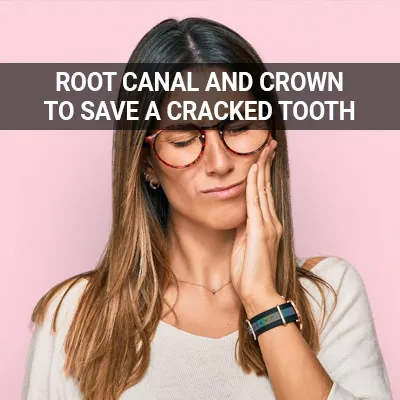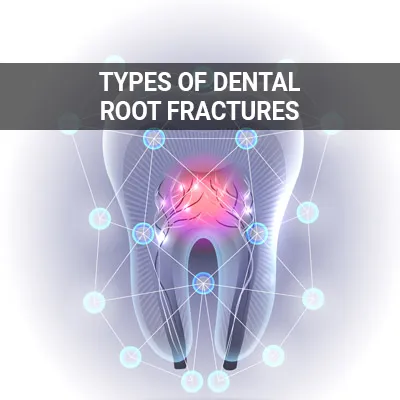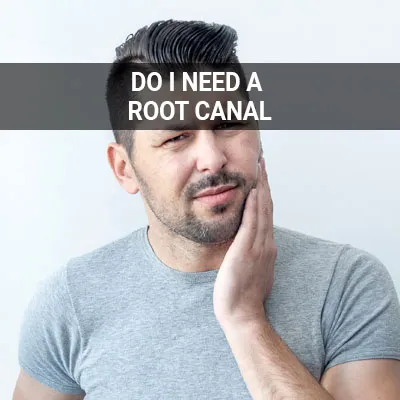The Truth Behind Root Canals Chandler, AZ
Root canal treatment can preserve an infected tooth. Left untreated, tooth infections can spread to other parts of the body. Root canal treatment is a standard procedure that saves millions of teeth each year.
Root canals are available at Flossophy Dental in Chandler and the surrounding area. Saving your tooth can be easier than you think. Call us today at (480) 522-2231 to schedule an appointment and learn more.
When Root Canals Are Necessary
Root canal treatments are one of the most common types of endodontic treatment. They become necessary when the inner tissue of the tooth's root canal (or pulp) becomes infected or inflamed. This may happen for several reasons: cracks or chips in the teeth, deep decay, or repeated dental procedures. The pulp may also sometimes be infected or inflamed without any signs of external damage.
There are some other telltale signs that someone may need a root canal. As endodontists are experts in addressing tooth pain, patients should seek medical attention immediately if they begin experiencing severe pain while biting or chewing. Many patients who need root canals also develop pimples on the gums, temperature sensitivity, swollen or tender gums, or darkened gums.
“As endodontists are experts in addressing tooth pain, patients should seek medical attention immediately if they begin experiencing severe pain while biting or chewing.”
Root Canals & Safety
Root canal treatments save millions of teeth each year. The American Association of Endodontists (AAE) estimates that over 15 million of these procedures are performed in the United States every year. On average, this comes out to over 41,000 root canal treatments per day.
This common procedure is both safe and effective, leading to predictable results. In fact, it is usually more dangerous to leave a tooth untreated than it is to undergo a root canal treatment. Root canal treatments are only necessary once bacteria have begun to multiply inside the tooth, causing an infection or abscess. This may lead to bone loss around the tip of the tooth's root; drainage problems extending from the root; and swelling in other areas of the face, head, or neck. Root canal treatments can stop these effects.
“The American Association of Endodontists (AAE) estimates that over 15 million of these procedures are performed in the United States every year.”
Misinformation About Root Canals
Research shows as many as 15% of people avoid having dental procedures such as root canals every year due to several common misconceptions. Even though most people would rather avoid these procedures, root canals present a much better option than a tooth extraction. Let us debunk some of the myths about root canals.
Myth #1: It is Extremely Painful
According to a survey by the American Association of Endodontists, 67% of Americans say their fear of pain is what keeps them from having a root canal. Thanks to modern dental technology, a patient getting a root canal will not experience any more pain than a filling. The infection in the tooth is likely causing more pain, which the root canal can relieve. While there will be some discomfort post-procedure, our dentist can manage it.
Myth #2: A Root Canal Will Make Me Sick
Unfortunately, many discussions online claim that getting a root canal will increase one's risk for other health issues, such as cancer, in the future. That is not true. This claim came out of poorly designed research done more than 100 years ago. Researchers have confirmed that there is no valid evidence linking root canals to any other diseases.
Myth #3: It is Better to Just Remove the Tooth
When choosing between saving a tooth and having it removed, always opt for preserving the natural tooth. No dental implant can match the look or functionality of a natural tooth. If a root canal gives a patient a chance to save the natural tooth, they should strongly consider it.
“Thanks to modern dental technology, a patient getting a root canal will not experience any more pain than a filling.”
Check out what others are saying about our dental services on Yelp: The Truth Behind Root Canals in Chandler, AZ
What to Know About Root Canals
Though root canal treatments are a safe and standard procedure, some complications may occasionally occur. These are rare but still crucial for patients to know about. The likeliest possible complication is that new infections may occur after a root canal treatment. Reasons may involve:
- A breakdown of the filling material, allowing bacteria back into the inner tooth
- A higher-than-anticipated number of root canals in a tooth, leaving one or more uncleaned
- A problem with the restoration allowing bacteria into the inner tooth
- An undetected crack in the tooth's root
In most cases, a doctor can address these problems with endodontic retreatment. Occasionally, however, endodontic surgery may be necessary (most commonly an apicoectomy, also known as a root-end resection).
“Though root canal treatments are a safe and common procedure, some complications may occasionally occur.”
Questions Answered on This Page
Q. How common are root canals?
Q. Are there any complications associated with root canals?
Q. What is common misinformation about root canals?
Q. What are the pros and cons of root canals?
People Also Ask
Q. What is an alternative to root canal treatment?
Q. How can a root canal help save my cracked tooth?
Q. When are root scaling and root planing necessary?
Q. What is the difference between endodontists and dentists?
Q. What are the keys to understanding root scaling and planing?
The Pros and Cons
Consider a few root canal pros and cons when weighing the options. Some of the benefits include:
- Preserving the natural tooth, which will function better than any dental implant
- Preventing the spread of infection
- Relief from tooth discomfort
- Being a viable alternative to tooth extraction
In the end, the most important reason to get a root canal is that it will save the natural tooth. This will help with chewing, normal biting force, appearance, and protecting the rest of the teeth from excessive wear and tear. However, there is no guarantee that the procedure will be 100% effective. Following the procedure, the patient will need to be careful with the tooth since it will become brittle and be more susceptible to cracks. In some cases, a failed procedure can cause an infection to spread.
As with any dental procedure, there are risks to having a root canal. No matter the case, our dentist and team will take every precaution necessary for the patient's safety. Our dentist will help each patient weigh these pros and cons to assist them in making the right decision.
“Consider a few root canal pros and cons when weighing the options.”
Frequently Asked Questions
Q. When would I need a root canal?
A. Root canals can be necessary when an infection in your tooth reaches the tooth's nerves and causes extensive decay. A bad crack or broken tooth can also require a root canal. Signs you may need a root canal include extreme tooth discomfort while chewing and sensitivity to hot and cold foods and liquids.
Q. Are root canals painful?
A. Several myths surround root canals, and pain is one of them. A root canal is no more painful than having a cavity filled. Our dentist will help you manage any pain during and after the procedure.
Q. Can I have another procedure other than a root canal?
A. When it comes to saving your natural tooth from infection or decay, a root canal is the preferred option. The only other viable alternative is tooth extraction. Dentists recommend attempting to save your natural tooth before choosing extraction.
Q. What can I do to avoid root canals in the future?
A. To avoid root canals in the future, practice good oral hygiene along with scheduling regular dental checkups and cleanings. Also, limit sugary foods to help protect your teeth from decay. If you play contact sports, wear a custom-made mouthguard to avoid the risk of teeth injury.
Endodontic Terminology
Learn More Today
Root canal treatments can make the difference between preserving or losing your teeth. We at Flossophy Dental can help. Call us today at 480-522-2231 to schedule an appointment and learn more.
Helpful Related Links
- American Dental Association (ADA). Glossary of Dental Clinical Terms. 2025
- American Academy of Cosmetic Dentistry® (AACD). Home Page. 2025
- WebMD. WebMD’s Oral Care Guide. 2025
About our business and website security
- Flossophy Dental was established in 2018.
- We accept the following payment methods: American Express, Cash, Check, Discover, MasterCard, and Visa
- We serve patients from the following counties: Maricopa County
- We serve patients from the following cities: Chandler, Gilbert, Mesa, Tempe, and Phoenix
- National Provider Identifier Database (1639561145). View NPI Registry Information
- Norton Safe Web. View Details
- Trend Micro Site Safety Center. View Details
Back to top of The Truth Behind Root Canals








